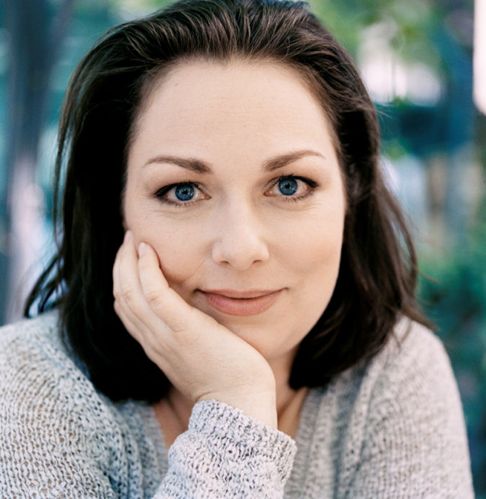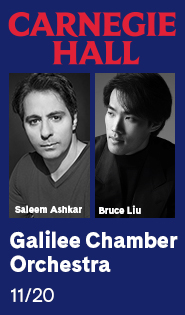Röschmann and Uchida make simpatico partners in heartfelt night of lieder

Dorothea Röschmann performed German lieder with Mitsuko Uchida Wednesday night at Carnegie Hall. Photo: Jim Rakete
Though neither is a particularly “flashy” musician, the pairing of soprano Dorothea Röschmann and pianist Mitsuko Uchida for a recital at Carnegie Hall on Wednesday had an undeniable star appeal. There was an exceptional seriousness about the performance that demanded careful and constant attention, but the atmosphere never felt stifled. The music-making was thoughtful, heartfelt, and immensely rewarding.
Röschmann’s voice has formidable power—though not of the booming, floor-shaking kind. There is no lack of volume, to be sure, but “loud” isn’t the word one would use to describe her voice. The power of this voice is in its weight, its strong spine, and in its thrilling tautness. There is also a warm glow in it, like light shone through amber.
On Wednesday that remarkable voice wasn’t doing everything Röschmann wanted it to do. Her middle was sometimes bare, her top intermittently showed a hard edge to it, and a handful of times as she crested the top of a phrase her tone gave out and lost its focus. A number of onsets were shaky. But even if her instrument was not in perfect form, she employed it as a true instrument of art, giving honest, detailed performances of her selected works.
Röschmann and Uchida began with Schumann’s Liederkreis, op. 39. From the opening song, “In der Fremde,” Röschmann made clear her approach to song. There is a poise, an economy of motion in her carriage that belies the emotional nuance of her readings. Her hands remain generally still, whether at her sides or placed on the lip of the piano, or folded together at her waist.
Even in this stillness, she captured the bliss of “Intermezzo,” the vivid narrative of “Waldesgespräch,” and the cheeky, conspiratorial playfulness of “Die Stille.” Each turn of phrase, delicately and deftly executed, could elicit a grin or a sigh. For someone so physically reserved, Röschmann has an absolutely transfixing presence on stage. It is difficult not to watch her, even if she doesn’t “do” as much as some younger singers with a penchant for choreography.
Uchida has garnered deserved accolades in her career as a recitalist. In her playing on Wednesday she showed just as keen an affinity for collaborative work as she has for the solo piano repertoire, maintaining the sort of presence that does not try to steal attention from the singer, but doesn’t recede into the background, either. She has a naturalistic approach, allowing the music to breathe on its own. She played with breathtaking simplicity in “Mondnacht,” then turbulent passion in “Schöne Fremde,” portraying rustling branches in “Frühlingsnacht.” Her fading on a final chord makes the note seem to linger long after it has stopped sounding, making it almost impossible to discern where silence has begun.
Intensity and smoke were present in Alban Berg’s Seven Early Songs. Romantic sweep (something one doesn’t always associate with the majority of Berg’s works) characterized the opening of “Nacht,” the first of the set, and as the later stanzas turned dark, an ethereal intensity came into Röschmann’s singing with a needle-sharp focus. The soprano reached soaring heights in “Nachitigall,” and showed more intimate warmth in “Im Zimmer,” while Uchida showered “Traumgekrönt” in fistfuls of glitter.
The final cycle on the program, Schumann’s Frauenliebe und -Leben, has a more traceable arc than either of the other two. In these eight songs we hear of a young woman’s first love, the bliss of marriage, the joy of motherhood, and finally her grief when she is widowed too soon. As before, Röschmann did not attempt a dramatic portrayal, retaining instead her radiant composure, but her transformation was believable nonetheless.
She showed bright-eyed, twirling innocence in the early songs. There was springing joy in “An meinem Herzen,” in which the young woman holds her infant child. Finally, in the last song, “Nun hast du mir den ersten Schmerz getan,” the full weight of Röschmann’s voice came crashing down in lamentation for the speaker’s dead husband.
Loneliness was still the theme for the first of the pair’s encores, “Nur wer die Sensucht kennt,” one of Schubert’s “Mignon” songs from Goethe’s “Wilhelm Meister.” Röschmann conveyed powerful sorrow in simple phrasing. A page turner made her only appearance of the night for Wolf’s “Kennst du das Land” from his own “Mignon” cycle, a lengthy encore that required focus from both performers. This song sits perfectly in the sweetest spot of Röschmann’s voice, a half a step below the midpoint, showing off the gorgeous, downy texture of her soft low notes.


